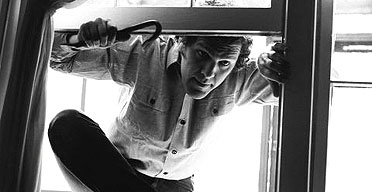
Not everybody will be taking a holiday this summer, so spare a thought for the hard-working burglar. While you are sunning yourself on foreign shores, thieves could be keeping a careful watch over your home. Three-quarters of us worry about being burgled while on holiday, according to security specialists Micromark but there is plenty you can do before you go away to protect your property.
Simple measures such as installing window locks and mortice locks for external doors do not just make life harder for thieves, they may also be a condition of your insurance policy. Check the small print - if you have not got the right security fittings, your insurer may reject any claim for theft or break-in.
The right security measures can even cut your home insurance premiums. HSBC, for example, offers discounts of up to 15% for homeowners who install a burglar alarm, fit approved window locks and join a neighbourhood watch scheme. After you have had locks fitted, get in touch with your insurer to see if you can get your premiums reduced.
Britain already has more CCTV cameras per capita than any other country, and you can add to this dubious record by installing one of your own. Home surveillance kits can cost as little as £29.99 and take about 30 minutes to install, says Nathan Cole, security product manager at Micromark. "Even self-confessed technophobes can follow the easy step-by-step installation process," he says.
Friendly neighbours
If the idea of installing a CCTV camera would make your home feel more like a prison than a fortress, you can take less drastic steps. Almost three-quarters of us ask neighbours to check the house and collect their mail when on holiday, according to HSBC. Letters sticking out of the letterbox for days on end are a sure sign that a house is empty. If you still get milk delivered, do not forget to cancel that too.
A relative or neighbour could even try to make your home look lived in while you are away, says Craig Allen, home product manager at insurer More Than. "See if someone can park their car in your drive, cut your lawn, draw your curtains at night and even switch on the lights, TV or radio for a while," he says.
Most insurance companies do not have any qualms about customers handing their keys to a trusted friend or neighbour. If you give your keys, say, to the cat sitter, that should not invalidate your cover - but check your policy to make sure.
Other tricks to make a home look lived in include leaving an old pair of shoes near the door, so it looks like someone is inside, or buying a timer for your lights.
Do not make life easy for thieves by leaving a spare key concealed by the front door, as most burglars are familiar with the common hiding places, says Martin Hall, head of underwriting at Zurich Insurance. "Don't leave car keys, money or valuables lying around. If you have particularly expensive or irreplaceable items, it may be worth investing in a professionally installed safe," he says.
Keep your home contents insurance up to date, and keep receipts and even photographs of particularly valuable or irreplaceable items. Many policies set a limit on expensive high-risk items such as computers, cameras, televisions, jewellery and art, often excluding any individual item worth more than £1,500, or demanding you register them separately (and possibly pay more).
Keep records
If you recently bought a new flat screen television, tell your insurer. "Mark expensive possessions with your postcode and house number using special security markers, which you can buy in any hardware or DIY store. Record the make, model and serial numbers of all your electrical equipment, so if police recover them after the burglary, you can prove the goods are yours," Hall says.
Most of us will only spend a week or two away this summer, but a lucky few may be taking a longer break. Every year, more than half a million homes are left unoccupied for more than 30 consecutive days, according to Halifax. Yet many owners do not realise that this absence could invalidate any claim for theft, vandalism and even water damage.
About half of insurers will not cover properties left empty longer than 30 days, although Halifax is one that does offer extra cover, allowing you to stay away for up to 60 days. Check your policy before you set off. If it does not offer cover for your entire trip, you may be able to arrange an extension for an extra fee.
Alternatively, you could hire a professional housesitter through companies such as Home Sitters or House Sitters. Some insurers actively encourage homeowners to use this type of service, but again it is wise to check that your policy will still cover you if you take this option.

